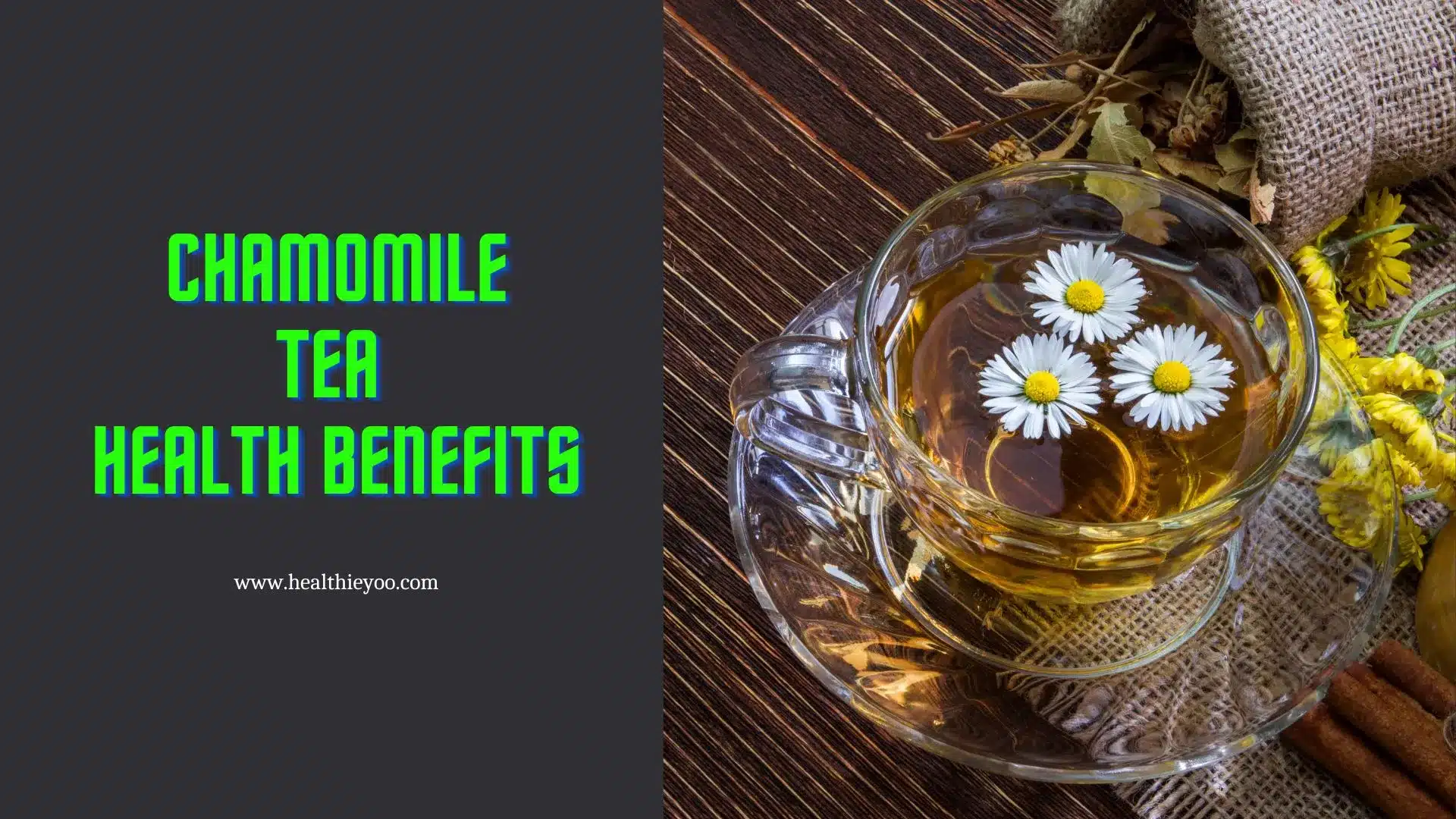The multiple health benefits of traditional medicinal chamomile tea – check out its use in anxiety, stress, gut health, pain, inflammation, hay fever, osteoporosis, prevention of cancer, and heart health. Does chamomile tea makes you sleepy and help with insomnia? Is chamomile tea safe during pregnancy?
Chamomile is a flowering herb that belongs to the Asteraceae family and is native to Europe, Asia, and Northern Africa. The two most commonly used types of chamomiles are German chamomile (Matricaria chamomilla) and Roman chamomile (Chamaemelum nobile). It is the oldest medicinal herb that has been known to man. The name chamomile derives from the Greek word- CHAMOS which means – ground and from the Greek-melos, meaning apple- indicating the aroma of chamomile, similar to the aroma of apples. Dried chamomile flowers are rich in terpenoids and flavonoids, which help in healing.
Chamomile preparations have been traditionally used for a variety of ailments such as hay fever, inflammation, muscle cramps, menstrual cramps, insomnia, ulcers, wounds, gastrointestinal complaints, rheumatic pains, and hemorrhoids. Many different preparations of chamomile have been developed, for example, as capsules, or tinctures, or applied topically as a cream or oil but the most popular is the form of herbal tea.
Chamomile is one of the oldest and most substantial medicinal herbs used all over the world and is advised for a variety of medicinal purposes. Chamomile is one of the most well-known herbal teas in the world, about a million cups are drunk every day. There are also traditional medicinal chamomile tea sachets (Tea Bags) in the market that contain chamomile flower powder, pure or mixed with other popular medicinal herbs.
In this article, the health benefits of chamomile tea have been discussed. Also, check out the answers to questions like – Does chamomile tea makes you sleepy? Is it safe to use during pregnancy? Is chamomile tea helping with insomnia and anxiety?
Traditional Use Of Medicinal Chamomile Tea
The medicinal use of chamomile, by Egyptians in old times, who “devoted chamomile flowers to their Gods as well as, the Sun because of its power to cure fevers. Chamomile was also used by Sir William Culpeper, who recommended it as an anti-inflammatory and digestive aid.
The traditional medicinal Chamomile tea has been used for centuries as an anti-inflammatory, antioxidant, and wound-healing medicine. People in ancient times used it for ulcers, eczema, skin irritations, wounds, burns, rheumatic pains, neuralgia, sciatica, hemorrhoids, and other problems. Let us check below some of the health benefits of chamomile tea and answers to some of the questions – Does chamomile tea makes you sleepy? Is chamomile tea safe to use during pregnancy? Is chamomile tea effective to use for insomnia and anxiety?
Health Benefits of Traditional Medicinal Chamomile Tea
COLD AND HAY FEVER
Cold is the most common infection among humans. Cold is a viral infectious disease of the upper respiratory tract. The common cold is not deadly or serious, but its complications can lead to pneumonia if not treated properly. Many studies suggest that steam inhalation with chamomile is beneficial for cold symptoms. Chamomile’s anti-inflammatory properties may help alleviate symptoms of hay fever, such as sneezing and itching.
INSOMNIA
Traditionally, chamomile supplements have been used to treat insomnia. Does chamomile tea makes you sleepy? Chamomile is used by people to relax and fall asleep and help with insomnia. Some studies have shown that insomniacs fall asleep immediately after consuming chamomile tea.
Many researchers consider chamomile and its extracts as a benzodiazepine. Benzodiazepines are a type of medication, used to treat insomnia and stress, it also relieves anxiety and muscle cramps and reduces seizures.
Does Chamomile Tea Makes You Sleepy?
The answer is Yes! Chamomile tea is often used as a natural sleep aid due to its calming and relaxing properties. Chamomile contains compounds called flavonoids and terpenoids, which have been shown to have mild sedative effects and may help reduce anxiety and promote relaxation and hence helps people with insomnia.
Several studies have found that drinking traditional medicinal chamomile tea before bedtime can improve sleep quality and duration, particularly in people with insomnia or sleep disturbances. However, the exact mechanisms by which chamomile promotes sleep are not well understood and may involve several different pathways in the body.
So, does chamomile tea makes you sleepy? Yes but it is important to note that chamomile tea may not be effective for everyone as a sleep aid, and other lifestyle factors such as diet, exercise, and stress management may also play a role in promoting healthy sleep. If you are experiencing sleep disturbances or insomnia, it is best to consult with a healthcare provider to determine the underlying cause and appropriate treatment options.

ANXIETY
Chamomile is known for its relaxing properties because of its warm and soothing properties. Chamomile triggers the release of hormones like serotonin and melatonin, which are known to fight stress. This tea also has anti-inflammatory properties, it can help reduce tension headaches and migraines. Chamomile tea can also help you fall asleep faster and sleep more restfully and helps people suffering from insomnia. Studies suggest that chamomile tea can help people relax. Chamomile has been reported to be used to treat generalized anxiety disorder (GAD). As we talked about above, the traditional medicinal Chamomile tea is known for its relaxing properties
Chamomile has been proven beneficial for sleep and anxiety because of its rich contents such as apigenin, a compound that has the same effects as benzodiazepines, an anti-anxiety drug. It has been suggested that chamomile tea can be used to treat anxiety, insomnia, and boredom in postpartum women, and chamomile tea has been shown to reduce depression and makes mood better in postpartum women. Chamomile also helps with sleep issues and insomnia in postpartum women.
ANTI-INFLAMMATORY PROPERTIES AND PAIN RELIEF
Inflammation is the immune system’s response to fight infection. Chamomile tea consists of chemicals that can lessen inflammation. Although, long-term inflammation is associated with many health problems, such as hemorrhoids, arthritis, gastrointestinal pain, autoimmune diseases, as well as depression.
Chamomile tea contains the antioxidant apigenin, which may lower the risk of inflammation and various types of cancer. At present, chamomile is widely used for wound healing, treating skin inflammation, and as a food additive. Externally, chamomile is also used to treat diaper rash, chicken pox, ear and eye infections, and nasal inflammation. It is also frequently used for mild indigestion and as a mild sedative.
Chamomile may help reduce inflammation and promote healing in the digestive tract, making it useful for conditions such as ulcers and gastritis
Chamomile’s antispasmodic properties may help ease muscle cramps and spasms. Chamomile may help reduce menstrual cramps and other menstrual symptoms such as bloating and mood swings.
CANCER TREATMENT AND PREVENTION
Most of the studies suggested that Apigenin is one of chamomile’s bioactive constituents which helps in fighting cancer cells. Studies on cancers of the skin, prostate, breast, and ovarian have shown positive and favorable effects. In the latest conducted research, chamomile extracts were led to cause the least growth inhibitory effects on normal cells but showed significant reductions in cell viability in various human cancer cell lines. Chamomile is extensively used to treat inflammations of the skin and mucous membranes, and for several bacterial infections of the skin, oral cavity, gums, and respiratory tract.
CARDIOVASCULAR CONDITIONS (CVD)
It has been recommended that constant consumption of dietary flavonoids may decrease the risk of death from heart disease in older men. It has been seen that ten of the twelve patients fell into a deep sleep immediately after drinking chamomile tea.
Chamomile contains beneficial properties that are good for the heart. While research into chamomile’s potential for heart health is ongoing, research suggests that drinking chamomile tea may be beneficial for people with conditions like coronary heart disease.
GASTROINTESTINAL CONDITIONS (GI DISORDERS)
Chamomile is mostly used as a home remedy for many problems such as gastrointestinal conditions, including indigestion, or colic, stomach pain, bloating (gas), cramps, ulcers, and gastrointestinal irritation.
Chamomile is mainly helpful for eliminating gas, relieving the stomach, and relaxing the muscles that help to move food through the intestines. Studies have shown that chamomile flower is effective, and safe to use in patients suffering from acute diarrheal symptoms. Chamomile extract can help in shorten the course of diarrhea in children and relieve the symptoms related to this disease. Diarrhea disappeared faster in the children treated with chamomile tea.
OSTEOPOROSIS
To prevent age-related bone loss, chamomile extract has been studied for its properties to stimulate the differentiation and mineralization of osteoblastic cells which are bone-forming cells. This loss increases the risk of fractures and stooped posture. Anyone can develop osteoporosis, but it’s more common in postmenopausal women. This can happen due to the effects of estrogen.
A study has revealed that chamomile may have anti-estrogenic effects. It is also helpful in increasing bone density, but the study authors warn that more research is required to show its benefit.
Who should not consume chamomile tea?
- Sometimes chamomile products contain some pollens from other plants, which can impure or makes its products unfit for people who are allergic to flowers. Pollen from grass, weeds, and other plants can cause allergic reactions.
- People who are allergic to chamomile products, should avoid chamomile tea.
- Chamomile tea can be contaminated with botulism spores like honey. Children may not be able to fight off the infection. It is better to avoid chamomile products.
Is Chamomile Tea Safe During Pregnancy?
While chamomile is generally considered safe for consumption, including during pregnancy, it is recommended to use caution and consult with a healthcare provider before using chamomile preparations during pregnancy.
There is some evidence to suggest that chamomile may have uterine-stimulating effects and could potentially increase the risk of miscarriage or preterm labor. However, the available studies on the safety of chamomile during pregnancy are limited, and more research is needed to fully understand the risks and benefits.
Additionally, some chamomile products may contain other herbs or ingredients that could be harmful during pregnancy. For example, chamomile tea blends may include other herbs that are not safe during pregnancy, such as pennyroyal or mugwort.
Therefore, if you are pregnant or planning to become pregnant, it is important to consult with your healthcare provider before using chamomile preparations. They can help you determine whether chamomile is safe for you to use and recommend appropriate dosages and forms of the herb.
Conclusion
Traditional medicinal chamomile tea is known for its calming and soothing properties, which make it a popular choice for promoting relaxation and reducing stress, and helping with insomnia. It is also commonly used as a natural remedy for digestive issues, such as bloating, indigestion, and nausea. It is generally considered safe and well-tolerated but may interact with certain medications or cause allergic reactions in some individuals. If someone is taking medication, they should consult their physician before taking the chamomile supplements. As with any herbal remedy, it is best to consult with a healthcare provider before using chamomile preparations for any health condition.

Dietitian Ana Salim
Related Posts

Psychophysiological Insomnia, Behavioral Insomnia of Childhood & DSPD – Symptoms, Causes & Treatment
Insomnia is the inability to sleep that includes difficulties getting to sleep and sustaining sleep. Insomnia or sleep disturbances are highly prevalent in children or

Switching to a Plant-based diet: A Key to Unlock Healthier and Longer life!
What are the benefits of switching to a plant-based diet? Why are athletes switching to a plant-based diet? What is a strict vegetarian diet? What

Rice Kanji/ Fermented Rice Bran/Water – Traditional Homemade Probiotic Rice
Here is a secret to traditional Rice Kanji, also known as fermented rice water or fermented rice bran with several benefits as one of the

Kefir Grains Make The Milk Better
What is Kefir? Or Milk Kefir? Kefir is a type of fermented milk drink that is made from kefir grains. The milk kefir drink

Best CBD for Anxiety & Endocannabinoid System
How to select the best CBD for Anxiety? What are Endocannabinoid System and CBD? Check out the real truth about CBD and how CBD works

12 Essential Nutrients for Pregnancy- Your Plate Guide
What is the real food in pregnancy? Which food to eat during pregnancy? What are the daily nutritional requirements during pregnancy? What is the importance

